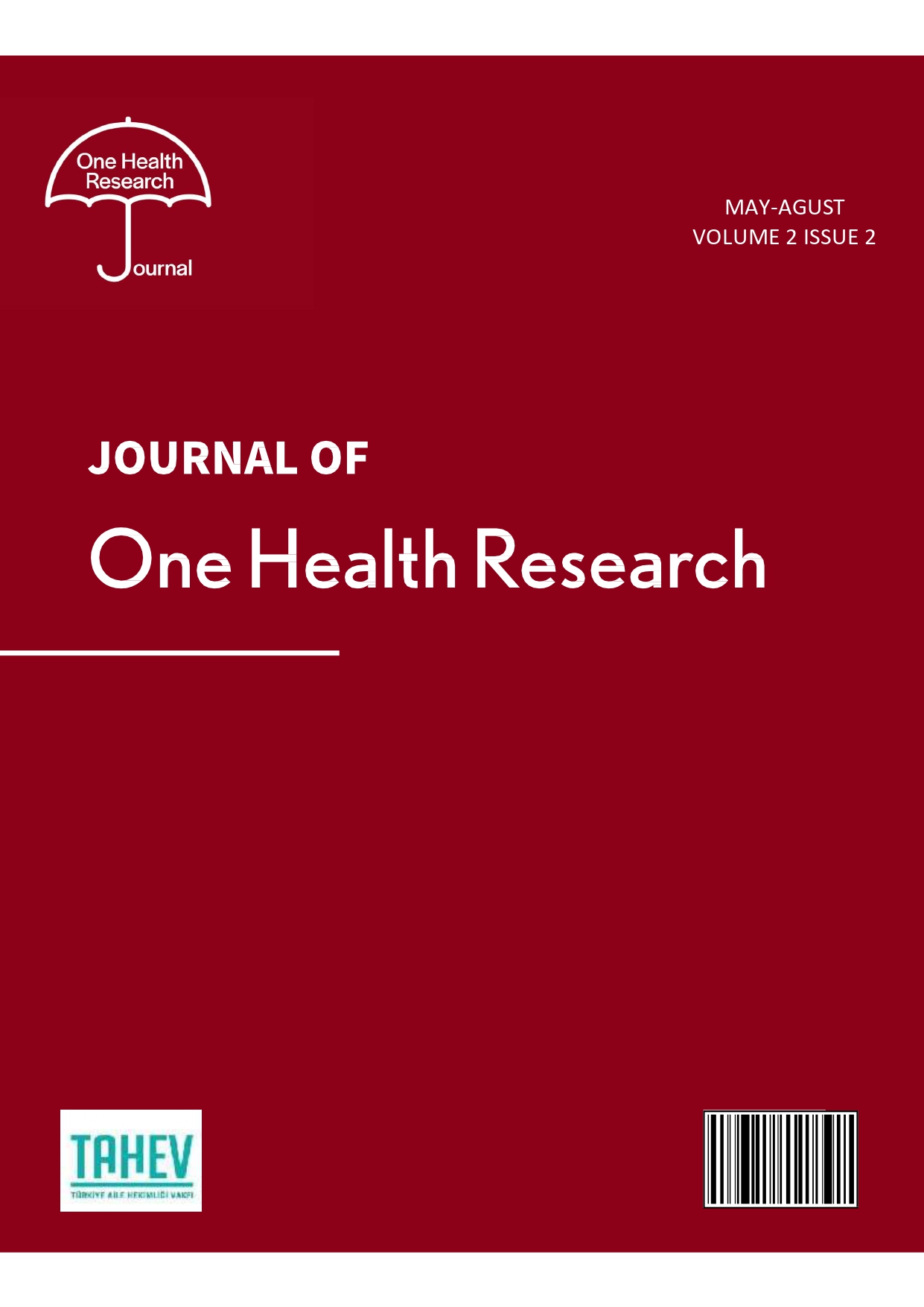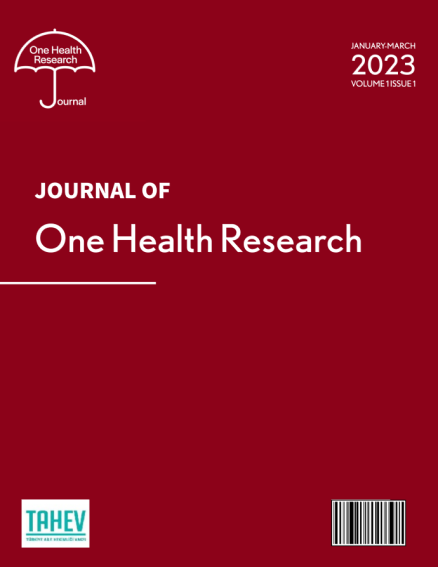Safe motherhood knowledge in pregenant women in a family health center: A cross sectional study
DOI:
https://doi.org/10.5281/zenodo.10971133Abstract
Background: The aim of this study was to evaluate the level of safe motherhood knowledge of pregnant women enrolled in Haseki EAH Bağcılar education family health center (e-ASM).
Method: Pregnant women enrolled in a total of 3 e-ASMs between November 01, 2020 and February 01, 2021 were included in the study. A total of 84 pregnant women enrolled in 3 e-ASMs and, a total of 81 (96.4%) pregnant women were included. Sociodemographic characteristics and the Safe Motherhood Knowledge Level in pregnant women questionnaire (SMKLQ) prepared by the researcher were applied to the pregnant women. The total score of the SMKLQ form and the subscales of family planning knowledge level (FPKL), prenatal knowledge level (PreKL), delivery knowledge level (DKL), and postnatal knowledge level (PostKL) were calculated.
Results: A total of 81 pregnant women were included and the total safe motherhood knowledge scale score of the pregnant women was 19.2±5.8. The SMKLQ total score was found to be lower in below high school level and who were not working (p=0.002 and p=0.005, respectively). Moreover, the FPKL, PreKL and PostKL score were found to be lower in those who were below high school (p=0.003, p=0.012, p=0.001, respectively).There was no correlation between SMKLQ total score and age, age at marriage, age at first pregnancy, gestational week and number of pregnancy (p=0.717, p=0.417, p=0.700, p=0.201, p=0.532, respectively).
Conclusion: Safe motherhood knowledge levels was found to be moderate and studies should be conducted to increase the safe motherhood knowledge levels of pregnant women.
References
Atasay B, Arslan S. Anne ve Yenidoğan Hakları Barselona Deklarasyonu. STED 2001;10(12):457-9.
Mengesha H, Lerebo W, Kidanemariam A, Gebrezgiabher G, Berhane Y. Pre-term and post-term births: predictors and implications on neonatal mortality in Northern Ethiopia. BMC Nurs 2016;15(1).
Chandrasekhar D, William AM, AA, Benny A, Karuppam A, Ahmed RO, Ahamedunni SAKV. Perceptions of essential obstetric care by rural pregnant women and safe motherhood approaches: An interventional study. Clinical Epidemiology and Global Health 2021;11:100731
Türkiye Nüfus ve Sağlık Araştırması (TNSA) 2018. Türkiye’de Doğurganlık, Üreme Sağlığı ve Yaşlılık. Hacettepe Üniversitesi Nüfus Etütleri Enstitüsü, TÜBİTAK, T.C. Cumhurbaşkanlığı Strateji ve Bütçe Başkanlığı. Ankara, 2019. http://www.sck.gov.tr/wp-content/uploads/2020/08/TNSA2018_ana_Rapor.pdf. Erişim tarihi: 07.01.2023.
Türkiye’de ve Suriyeli Sığınmacılarda Anne Çocuk Sağlığı Hizmetlerinin Kullanımına Karşılaştırmalı Bir Bakış: Doğum Öncesi Bakım, Doğum Hizmetleri, Doğum Sonrası Bakım. Türkiye 2018 Türkiye Nüfus ve Sağlık Araştırması İleri Analiz Çalışması. Hacettepe Üniversitesi Nüfus Etütleri Enstitüsü. 2021. Ankara, Türkiye.
Akın, A. Güvenli Annelik. Sağlık ve Toplum Dergisi 1998;8; 3-4:33.
Güvenli Annelik Eğitim ve Danışmanlık Programı. Türkiye Aile Sağlığı ve Planlaması (TAP) Vakfı. https://www.tapv.org.tr/programlar/guvenli-annelik/#. Erişim tarihi: 07.01.2023
Doğum Öncesı̇ Bakım Yönetı̇m Rehberı̇. https://hsgm.saglik.gov.tr/depo/Yayinlarimiz/Rehberler/dogum_oncesi_bakim_08-01-2019_1.pdf. Erişim tarihi: 07.01.2023
Kurnaz MA, Can H, Atsız Sezik H, Çakır YT, Tuna M, Ay Z. Aile hekimleri gebeleri ne kadar ve nasıl izliyor? Türk Aile Hek Derg 2015;19(4):187-95.
Ravish KS, Spoorthy Sagar, Ranganath TS, Manjula K, Sushil I Kumar. Birth Preparedness and Complication Readiness For A Safe Motherhood Among Antenatal Women Attending an Urban Health Centre, Bengaluru. NJRCM 2017;6:4:319-25.
Pı̇rı̇nçcı̇ E, Polat A, Kumru S, Köroğlu A. Bı̇r Ünı̇versı̇te Hastanesı̇nde Doğum Yapan Kadınların Doğum Öncesı̇ Bakım Alma Durumu ve Etkı̇leyen Faktörler. ADÜ Tıp Fakültesi Dergisi 2010;11(2):1-7.
Küçük E. Giresun 1 nolu sağlık ocağı bünyesinde doğum yapan kadınların doğum öncesi, doğum ve doğum sonu bakım alma sıklığı. Karadeniz Teknik Üniversitesi. Sağlık Bilimleri Enstitüsü. Yüksek Lisans Tezi. Danışman: Çan G. 2004. Türkiye.
Karabulutlu Ö, Akdemir G. 15-49 Yaş Grubundaki Kadınların Doğum Öncesi Bakım Alma Sıklığı ve Etkileyen Faktörleri Belirleme, Verilen Hizmetin Uygunluğunu Değerlendirme. Anadolu Hemşirelik ve Sağlık Bilimleri Dergisi. 2021;24(4):520-3.
Yılmaz L, Koruk F, Koruk İ. Şanlıurfa’da bir devlet hastanesinde doğum yapmış kadınların doğum öncesi bakım hizmetlerini alma durumu, bu hizmetlerin niteliği ve etkileyen faktörler. Mersin Univ Saglık Bilim Derg 2018;11(2):209-218.
Singh R, Neogi S, Hazra A, et al. Utilization of maternal health services and its
determinants: a cross-sectional study among women in rural Uttar Pradesh, India.
J Health Popul Nutr 2019;38(1).
Efendi F, Chen C, Kurniati A, Berliana S. Determinants of utilization of antenatal care services among adolescent girls and young women in Indonesia. Women Health
;57(5):614–29.
Kamineni V, Murki AD, Kota VL. Birth preparedness and complication readiness in pregnant women attending urban tertiary care hospital. J Family Med Prim Care
;6:297-300.
Taskın I. Uluslararası sözlesmeler ısıgında kadının durumu. Cumhuriyet Üniversitesi Hemsirelik Yüksekokulu Dergisi 2004;8:16-22.
Özvarıs SB, Akın A. Türkiye'de Dogum öncesi bakım hizmetlerinden yararlanma. https://huksam.hacettepe.edu.tr/Turkce/SayfaDosya/turkiyede_dogum_oncesi.pdf. Erişim tarihi: 07.01.2023.
Downloads
Published
How to Cite
Issue
Section
License
Copyright (c) 2024 Journal of One Health Research

This work is licensed under a Creative Commons Attribution 4.0 International License.




